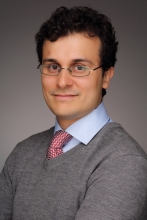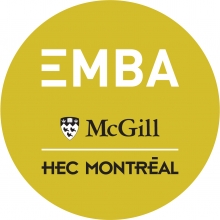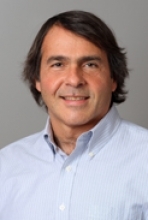Montreal-based YouTube mega-channel Watchmojo recently launched a hockey web show through its new Watchmojo Studios division. The Lineup is part panel show and part gameshow, pitting teams of personalities against each other in a hockey-trivia battle, with each episode following a specific theme. The inaugural episode was about the all-time top 10 NHL forwards and featured Andy Nulman (BCom'83), co-founder of Play the Future and former CEO of Just For Laughs. Mr. Nulman enjoyed his experience, saying that “The Lineup was a blast.

CardioLink was the winner of this year’s Dobson Cup Grit Prize, which honours “outstanding dedication towards establishing [a] business venture.” The multidisciplinary team’s members are pulled from McGill University, Concordia University and the École de technologie supérieure (ÉTS). The CardioLink team is working towards a new, affordable method for replacing heart valves, which also happens to be safer for the patient and less frustrating for surgeons.

In a letter to Malaysia’s The Star Online, management consultant Dr Ranjit Singh Malhi takes issue with the widely-held distinction between managers and leaders. Though many theorists draw a line between effectiveness (the bailiwick of leaders) and efficiency (a manager’s wheelhouse), Dr.

Poets and Quants recently asked business educators to name their top picks for films from which MBAs could learn a lesson or two. The range of movies mentioned was wide, and included some films that do not, at first, seem to be obvious choices. So, while films like The Wolf of Wall Street, 1986’s Gung-Ho, and Margin Call show up on the list, some professors give the nod to movies like Zootopia and The Godfather.

As part of its series on social innovations at different universities, Le Délit recently took a look the McGill Dobson Centre for Entrepreneurship’s efforts, including the McGill X-1 Accelerator, which is a 10-week intensive that gives participants a chance at pitching their projects to the Centre’s network of entrepreneurs in hopes of landing funding. The program is a fantastic gateway into the world of finance.
On May 3rd, Brett Hickey (BCom'02), founder and CEO of middle-market alternative asset manager Star Mountain Capital, is slated to speak at the 20th Annual Milken Institute Global Conference. He will be addressing the Emerging Manager Roundtable, which will deal with best practises, innovation, and scale.

From 136 initial pitches, 121 went on to compete. The semi-finals brought the field down to 40 finalists and now, the 2017 McGill Dobson Cup powered by National Bank has revealed the slate of winners. Up for grabs was a total of $106,000, which was awarded to the top teams in the categories of Social Enterprise, Health Sciences, Small & Medium Enterprise, and Innovation Driven Enterprise. This year’s slate of entries came from all of McGill’s faculties and schools.

As the world becomes ever more diversified and globalized, it’s time for the C-suite to reflect that reality. At the head of the pack, the joint McGill-HEC Montréal EMBA program has aimed to keep its classes as diverse as possible. There is a fellowship in place for nominations from the non-profit space, and another for aboriginals. The program also takes advantage of conferences to reach out to women and entrepreneurs.

Desautels Associate Professor Karl Moore was recently interviewed on The Grilled Podcast to discuss his development as a businessman and academic, collaboration and bringing CEOs in to speak to his classes. He then interviews those CEOs on his podcast, The CEO Series.
Eytan Bensoussan (BSc’05, MBA/LLB’10) loves a challenge. He has studied math, bio-chemistry, political science and management. In his career life, he worked for McKinsey & Company, the Globe and Mail, and Ferst Capital Partners before co-founding Ferst Digital, which is a modern banking platform for small businesses and start-ups.
Desautels Professor Reuven Brenner writes in a recent Asia Times op-ed that, as societies become literate, earlier metaphors become codified as literal truths, much to the detriment of those societies and the cultures that exist within them. There are parallels between the “fake news” of today and analogues in early societies, where one people’s superstitions about another group could bring the two into conflict.”

Ottawa has released its plan to legalize marijuana, and the hit on big cannabis shares has been heavy. Concerns about how fast the government is moving to squeeze out illegal producers, a law-enforcement-heavy public announcement and a feeling that the government is stepping back from its plans for an industrial-scale market are leaving investors with questions.

In some ways, it’s the party of the year. On April 7th, Canada’s biggest fashion names gathered in Toronto for the fourth Canadian Arts and Fashion Awards. The event was heavy on pizzazz, from the pre-event cocktails to the after-dinner party. The guest list was a who’s who of Canada’s glitterati, from Erdem Moralioglu to David Dixon.

In the Australian coastal shipping reform efforts, the discussion has come down to whether or not cabotage (the practice of using foreign companies for domestic shipping) should be promoted or limited.
In The Maritime Executive, Dermot Loughane says that yes, national-flag shipping tends to cost more, but a healthy industry gets crewmembers buying houses and goods with dollars that would otherwise be going overseas. Mr. Loughane points to Canada, where “It is a rare thing now … to find an experienced Master or Chief Engineer administering the shipping system.”
New Deal Brewing Co. co-owner Daleyne Guay (EMBA’2016) says that, over the past five years, microbews have risen to 8.9% of the Quebec market, while the majors have lost 1% per year and imports have taken up the space in-between. Within this context, Mr. Guay is on a mission to make you to reach for one of his Boldwin beers before you grab that next Stella Artois. New Deal has positioned itself as the province’s only 100% organic brewery, which also maximises sustainability throughout its production process.
